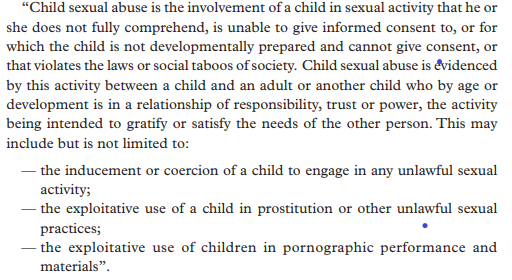In my last post on CSA & Your Child I promised to help us understand what CSA means. In this post, we will explore the meaning, signs and effects of CSA.
What is CSA?
It is an acronym that stands for Child Sexual Abuse, and in plain English, it would mean ‘abusing a child sexually, i.e. having or expressing any form of action/relationship towards a child of a sexual nature’.

With CSA, people are more familiar with touching acts (such as touching a child’s private parts or making the child touch the adult), than non-touching acts. However, both can be as dangerous. So here are some non-touching acts:
- Exposing genitals to a child
- Making the child watch porn or inappropriate videos
- Having kids watch or listen to adults having sex
- Taking and sharing nudes of a child
- Watching a child inappropriately while dressing or in the bathroom
- Encouraging kids to touch each other inappropriately
Some Tell-Signs of an Abused Child?
Ever wondered why your child suddenly does not want to be left alone with ‘Uncle X’ or ‘Aunty Y’? Or perhaps they have become suddenly disrespectful towards a particular adult? They may be tell-signs.
I have had parents often express concerns about their kids who display inappropriate sexualized behaviours, but refuse to come to terms with the sad reality that perhaps, it is an indication of a larger problem. Sexually abused children often show physical and behavioural signs, research has shown.

As a general rule of thumb, if you feel uncomfortable with an adult around your or someone else’s child, feel free to speak to the child (if they are yours) or to their parent. Get that feel of ‘something’s not right’? It probably isn’t.
What if a Child Reports CSA to Me?
DO’s
- Let them know you believe them and reassure them it is not their fault
- If they are NOT your kids, get their parents involved if safe to do so (unless the child reports a parent as the perpetrator)
- Gather the facts- ASK OPEN-ENDED QUESTIONS. Get as much information as possible such as where, when, who, how?
- Take them to see a Doctor.
- Involve Law Enforcement and Child Protective services (where available)
- Show love and support
- Seek professional help/counselling for them
DO NOT
- Get angry, yell or show frustration
- Tell the child it was something THEY DID
- Ask leading questions.
- Tell the child to ‘tell no one’ or promise to do so yourself
- Invite the adult and make the child retell their story (Yes, this happened to me, of course, I didn’t share again- story for another day)
- Pretend like nothing happened
Side Effects of CSA
From research and my personal experience, I do know that the effects of CSA can follow a child into adulthood, and each child can express different things on any end of the spectrum, at different times. A key factor I experienced was LACK of TRUST for authority figures and a number of things in the diagram below including being suicidal.

Why Should YOU Care?
CSA can happen to any child under the most scrutiny. This if often because research has shown that 90% of perpetrators are known to the child and 68% are often family members. Do you know that during this COVID-19 lock-down there has been a lot of news on incest related sexual abuse cases. Mostly from older male family members to younger females. The mistake starts from not paying attention enough because we often think ‘our kids are in safe hands’.
We should also care because when we understand what CSA is, and how it can impact a person for rest of their lives, we empower ourselves with the right knowledge to do something about it.
You should care because YOUR Child or a Child you know and love may be going through this silently. I hear you say “God forbid”, to which I say “Amen”. But a little learning and vigilance added to that prayer would do a lot of good, don’t you think?
We don’t all have to experience it to fight against it. It must be a collective responsibility to protect our children.
I not only want to help create awareness for protecting children, but also empower adults once abused to rise above. As an adult dealing with past event of CSA, you may still need professional help or counselling, so seek help if need be.
Leave a Reply